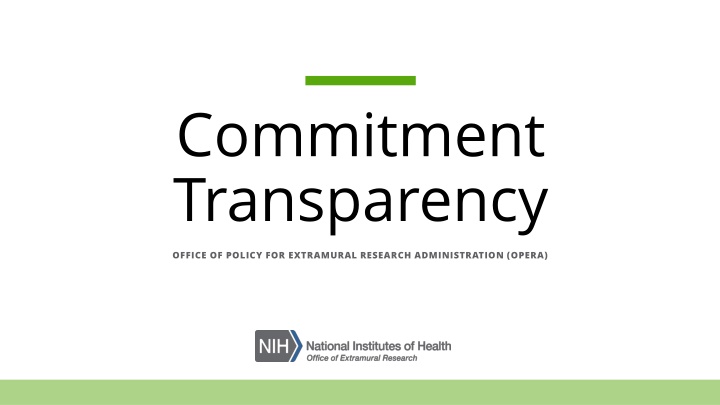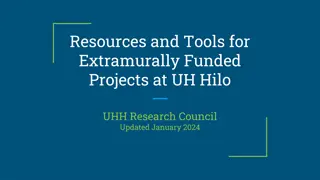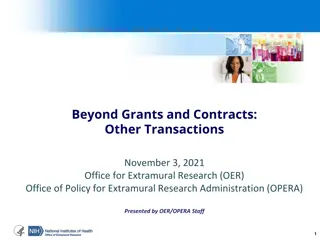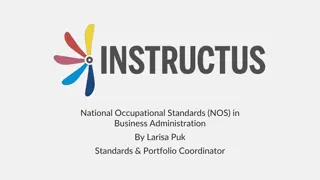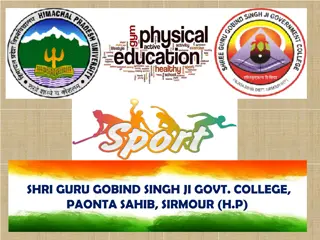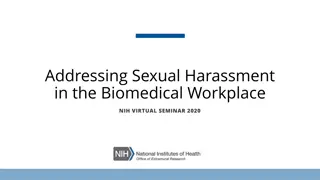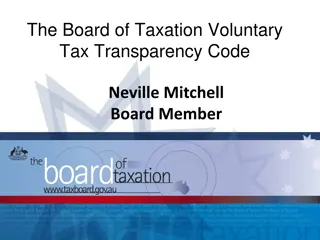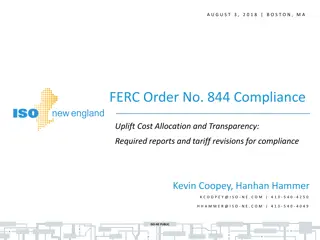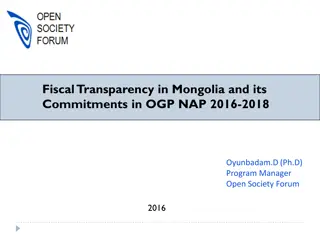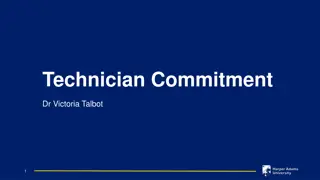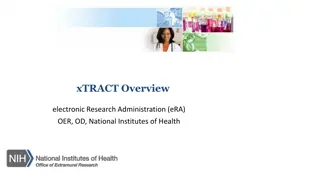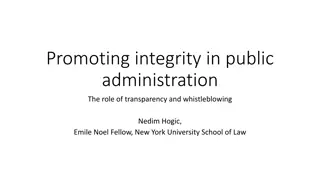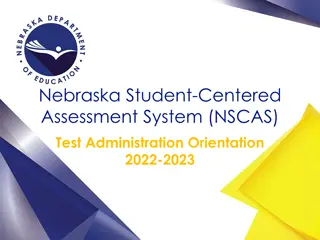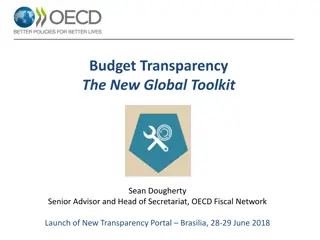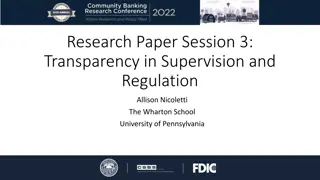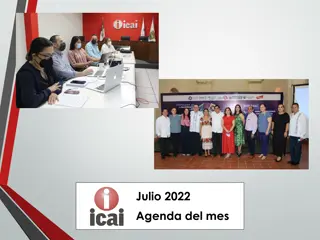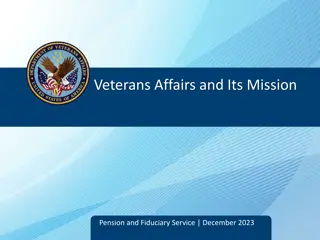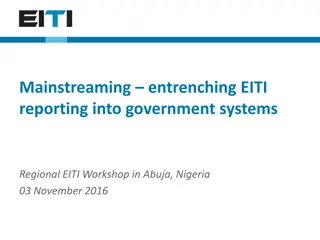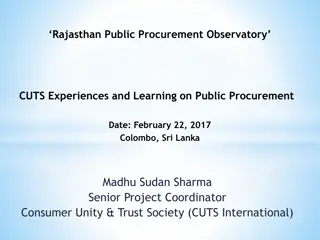Overview of Commitment to Transparency in Extramural Research Administration
Explore the efforts of the Office of Policy for Extramural Research Administration (OPERA) in promoting commitment and transparency in research activities. Learn about the importance of disclosure, examples of violations, and the role of the Joint Committee on Research Environments (JCORE) in providing guidance on maintaining integrity in research practices.
Download Presentation

Please find below an Image/Link to download the presentation.
The content on the website is provided AS IS for your information and personal use only. It may not be sold, licensed, or shared on other websites without obtaining consent from the author.If you encounter any issues during the download, it is possible that the publisher has removed the file from their server.
You are allowed to download the files provided on this website for personal or commercial use, subject to the condition that they are used lawfully. All files are the property of their respective owners.
The content on the website is provided AS IS for your information and personal use only. It may not be sold, licensed, or shared on other websites without obtaining consent from the author.
E N D
Presentation Transcript
Commitment Transparency OFFICE OF POLICY FOR EXTRAMURAL RESEARCH ADMINISTRATION (OPERA)
Overview Background on commitment transparency efforts across the government What s NOT NOT changing? Overview of Updates Biosketch Other Support Timeline and Next Steps Discussion/Questions
What is commitment transparency? Transparency and reporting of Transparency and reporting of all all research activities, domestic and foreign research activities, domestic and foreign Openness and transparency enables productive collaboration and helps ensure appropriate disclosure of potential conflicts of interest and commitment Failure by some researchers at NIH-funded institutions to disclose substantial contributions of resources from other organizations, including foreign governments, threatens to distort decisions about the appropriate use of NIH funds 3
Joint Committee on Research Environments (JCORE) In May 2019, the National Science and Technology Council (NSTC) established JCORE to address issues related to research environment safety, integrity, and productivity. The JCORE Subcommittee on Research Security brings together agencies from across the government to: Develop guidance for Federal departments and agencies Develop best practices for universities and other research institutions Develop education and outreach materials that highlight examples of risks to research 4
June 2020 JCORE Guidance JCORE Subcommittee on Research Security issued public guidance on commitment transparency Examples of conduct that violate funding agency policies: Failures to disclose: Financial conflicts of interest Conflicts of commitment External employment arrangements Financial support that overlaps with US funding Shadow labs or other parallel research activities Diversion of intellectual property Peer review violations 5
What about NIH? We ve had cases covering all these examples! At least 201 scientists 90+ institutions, many fields of biomedicine, all over US Denials despite documentation to the contrary; explanations I allowed XXX to use my name as PI I knew nothing about this grant I didn t actually do the work The affiliations [in published papers] were in error 6
Myths re: Financial Conflict of Interest and Foreign Components
NO CHANGES TO FOREIGN COMPONENTS OR FCOI!
Identifying Foreign Components Key measures for identifying foreign components are as follows: Is a portion of the project being conducted outside the US? No not a foreign component Yes are the activities being conducted outside of the US significant? Indicators include: Collaborations with investigators at a foreign site anticipated to result in co-authorship; Use of facilities or instrumentation at a foreign site; or Receipt of financial support or resources from a foreign entity. Foreign components require NIH prior approval 9
Financial Conflicts of Interest (FCOI) Requirements found in 42 CFR Part 50, Subpart F Investigators must disclose their significant financial interests to their institution This requirement includes financial interests received from a foreign entity Separate and distinct from other support and foreign components 10
So what is changing? Our Approach To support the need for full transparency, NIH is clarifying policies and updating forms and instructions Utilized JCORE guidance, and collaborated with other research agencies Outcomes: Provided details on in-kind contributions, defined gifts , and outlined the purpose of the biosketch Updated application forms and instructions for Biosketch and Other Support Updated data format and data collections in collaboration with NSF to reduce applicant and recipient burden 11
Biosketch Updates NIH GPS Submission of a biosketch is a longstanding policy Biosketch requirements are currently spread out throughout the NIH Grants Policy Statement (GPS) NIH will include a new subsection in the GPS 2.3, to consolidate biosketch requirements for easier reference Who submits a biosketch: senior/key personnel When is it submitted: New apps, new senior/key personnel at RPPR, with prior approval requests for change in senior/key personnel How it s used: reviewers utilize the biosketch to ensure that individuals included on the applications are equipped with the skills, knowledge, and resources necessary to carry out the proposed research. 13
Biosketch Updates Form and Instructions Updated to align with JCORE, minimize duplication of Other Support, and harmonize format with NSF Updated title of Section B to capture all scientific appointments Clarify instructions for Section B to request details on all scientific appointments, foreign and domestic Removed Section D: Research Support, which duplicates information provided in Other Support Removed instructions for Research Support. Note: Scholastic Performance will remain in Section D for fellowship Biosketch. All research support information is now consolidated in the Other Support section of the application. all positions and 14
Biosketch Mock-Up Non-Fellowship Format Page CURRENT FORMAT (as of July 2020) Mock-up with Proposed Changes (in red) 15
Biosketch Mock-Up Fellowship Format Page CURRENT FORMAT (as of July 2020) Mock-up with Proposed Changes (in red) 16
OTHER SUPPORT
Other Support Updates NIH GPS Other support policy language was updated in Dec 2019 to incorporate JCORE guidance and clarify requirement to report all resources in support of all research endeavors Additional updates will clarify: Definition of gift: Definition of gift: Gifts are resources provided where there is no expectation of anything (e.g. time, services, specific research activities, money, etc.) in return. Expectations for reporting in Expectations for reporting in- -kind resources: kind resources: in-kind contributions, e.g. office/laboratory space, equipment, supplies, employees, students. If the time commitment or dollar value of the in-kind contribution is not readily ascertainable, the recipient must provide reasonable estimates. 18
Other Support Updates Foreign Resources IC scientific program and grants management staff will review Other Support information before award to ensure the following: Any foreign resources that meet the definition of a foreign component have received appropriate prior approval Institutions are required to submit copies of foreign contracts and awards for all foreign activities and resources that are reported in Other Support. If they are not in English, recipients must provide translated copies. 19
Other Support Updates Format Page Current Other Support format page does not collect structured data or allow recipients to provide detail on in- kind contributions CURRENT FORMAT (as of July 2020) New format page and detailed instructions document have been developed 20
Other Support Updates Format Page New NIH mock-up with Proposed Changes 21
Other Support Updates Instructions Developed new, detailed instructions document to accompany the updated Other Support format page Highlights: Includes updated definitions and terms as included in the NIH GPS Provided detailed instructions for how to complete each data element of the form. Added links to GPS for further details. 22
Estimated Timeline Oct/Nov 2020: Guide notice announcing policy, form, and instruction updates Jan 2021: Begin requiring use of updated form templates Later in 2021/2022: Integrating Other Support templates into ScienCV 24
